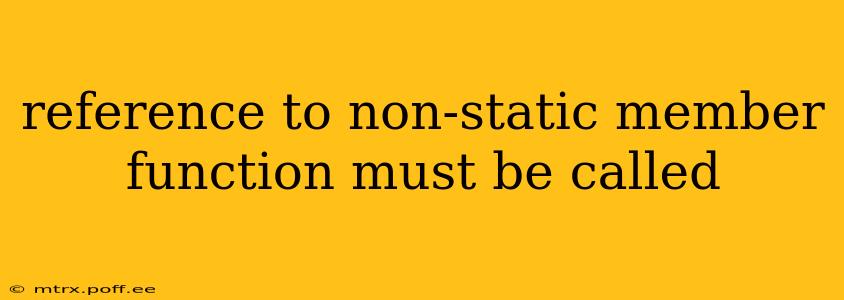The error "reference to non-static member function must be called through an object or pointer" is a common one in C++ programming. It arises when you attempt to call a member function (a function that belongs to a class) without specifying an instance (object) of that class. This is because non-static member functions operate on the data within a specific object, and they need to know which object's data to work with.
Let's break down why this happens and how to fix it.
Understanding Static vs. Non-Static Member Functions
In C++, member functions can be either static or non-static. The key difference lies in how they relate to the class's data:
-
Static Member Functions: These functions don't operate on the data of a specific object. They are associated with the class itself, not any particular instance. They can be called directly using the class name::function_name() syntax. They also cannot access non-static member variables.
-
Non-Static Member Functions (Instance Member Functions): These functions work with the data of a specific object. They need an object to operate on. They can access both static and non-static member variables of the class.
The Problem: Trying to Call a Non-Static Function Directly
The error message appears because you're trying to use a non-static member function as if it were a static function. For example:
class MyClass {
public:
void myFunction() {
// This function operates on member variables of a MyClass object.
std::cout << "Hello from myFunction!\n";
}
};
int main() {
// Incorrect: Attempting to call a non-static member function directly.
MyClass::myFunction(); // This will cause the compiler error.
return 0;
}
The compiler complains because myFunction() needs an object of MyClass to know which object's data to use.
The Solution: Calling Through an Object or Pointer
To correctly call a non-static member function, you must call it through an object or a pointer to an object:
#include <iostream>
class MyClass {
public:
void myFunction() {
std::cout << "Hello from myFunction!\n";
}
};
int main() {
MyClass myObject; // Create an object of MyClass.
// Correct: Calling myFunction() through the object.
myObject.myFunction();
// Alternatively, using a pointer:
MyClass* myPointer = &myObject;
myPointer->myFunction(); // Using the arrow operator -> for pointers.
return 0;
}
This code compiles and runs without errors because myFunction() is now called through a properly instantiated object (myObject) and a pointer (myPointer).
Common Scenarios and Solutions
Here are some common scenarios that can lead to this error and their solutions:
1. Calling a member function within another member function of the same class:
This is usually correct, as long as you're properly accessing the members within the correct context. If you are within a member function, this pointer is available to access other members.
2. Using the function in a different class or function:
You must create an instance of the class containing the non-static function, then call the function on the instance.
3. Forgetting to instantiate the object:
Ensure you have correctly created an object of the class before attempting to call its non-static member functions.
In Summary
Remember, non-static member functions belong to objects, not the class itself. Always call them through an object or a pointer to an object to avoid this common C++ compiler error. Understanding the difference between static and non-static members is crucial for writing correct and efficient C++ code.
